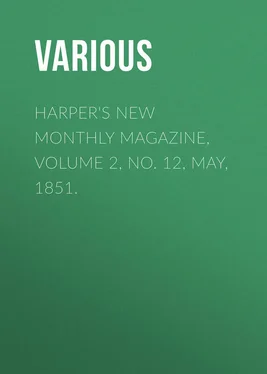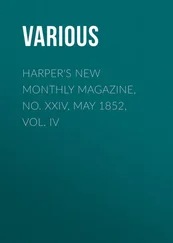Various - Harper's New Monthly Magazine, Volume 2, No. 12, May, 1851.
Здесь есть возможность читать онлайн «Various - Harper's New Monthly Magazine, Volume 2, No. 12, May, 1851.» — ознакомительный отрывок электронной книги совершенно бесплатно, а после прочтения отрывка купить полную версию. В некоторых случаях можно слушать аудио, скачать через торрент в формате fb2 и присутствует краткое содержание. Издательство: Иностранный паблик, Жанр: periodic, foreign_edu, на английском языке. Описание произведения, (предисловие) а так же отзывы посетителей доступны на портале библиотеки ЛибКат.
- Название:Harper's New Monthly Magazine, Volume 2, No. 12, May, 1851.
- Автор:
- Издательство:Иностранный паблик
- Жанр:
- Год:неизвестен
- ISBN:нет данных
- Рейтинг книги:3 / 5. Голосов: 1
-
Избранное:Добавить в избранное
- Отзывы:
-
Ваша оценка:
- 60
- 1
- 2
- 3
- 4
- 5
Harper's New Monthly Magazine, Volume 2, No. 12, May, 1851.: краткое содержание, описание и аннотация
Предлагаем к чтению аннотацию, описание, краткое содержание или предисловие (зависит от того, что написал сам автор книги «Harper's New Monthly Magazine, Volume 2, No. 12, May, 1851.»). Если вы не нашли необходимую информацию о книге — напишите в комментариях, мы постараемся отыскать её.
Harper's New Monthly Magazine, Volume 2, No. 12, May, 1851. — читать онлайн ознакомительный отрывок
Ниже представлен текст книги, разбитый по страницам. Система сохранения места последней прочитанной страницы, позволяет с удобством читать онлайн бесплатно книгу «Harper's New Monthly Magazine, Volume 2, No. 12, May, 1851.», без необходимости каждый раз заново искать на чём Вы остановились. Поставьте закладку, и сможете в любой момент перейти на страницу, на которой закончили чтение.
Интервал:
Закладка:
Charles Wolfe was one of those characters eminently fitted to make good men, but destitute of some of the qualities for what the world calls greatness. He was a high type of that class who form the cynosure of their own peculiar circles, where they are admired as much for the kindliness of their nature as the extent of their attainments, and the power and versatility of their talents. But wanting the self-esteem, the unwavering self-confidence, the perseverance and unshaken resolution which go to make up greatness, he possessed in an eminent degree those kindly sympathies, tender feelings, and that earnest devotion to the interests and wishes of his fellows, which among friends and intimates make goodness so much more lovable than greatness.
MAURICE TIERNAY, THE SOLDIER OF FORTUNE
CHAPTER XXVI
There was no resisting the inquisitive curiosity of my companion. The short, dry cough, the little husky "ay," that sounded like any thing rather than assent, which followed on my replies to his questions, and, more than all, the keen, oblique glances of his shrewd gray eyes, told me that I had utterly failed in all my attempts at mystification, and that he read me through and through.
"And so," said he, at last, after a somewhat lengthy narrative of my shipwreck, "and so the Flemish sailors wear spurs?"
"Spurs! of course not; why should they?" asked I, in some astonishment.
"Well, but don't they?" asked he again.
"No such thing; it would be absurd to suppose it."
"So I thought," rejoined he; "and when I looked at yer 'honor's' boots (it was the first time he had addressed me by this title of deference), and saw the marks on the heel for spurs, I soon knew how much of a sailor you were."
"And if not a sailor, what am I, then?" asked I; for, in the loneliness of the mountain region where we walked, I could afford to throw off my disguise without risk.
"Ye'r a French officer of dragoons, and God bless ye; but ye'r young to be at the trade. Arn't I right now?"
"Not very far from it certainly, for I am a lieutenant of hussars," said I, with a little of that pride which we of the loose pelisse always feel on the mention of our corps.
"I knew it well all along," said he, coolly; "the way you stood in the room, your step as you walked, and, above all, how ye believed me when I spoke of the spring tides, and the moon only in her second quarter, I saw you never was a sailor anyhow. And so I set a-thinking what you were. You were too silent for a peddler, and your hands were too white to be in the smuggling trade; but when I saw your boots, I had the secret at once, and knew ye were one of the French army that landed the other day at Killala."
"It was stupid enough of me not to have remembered the boots!" said I, laughing.
"Arrah, what use would it be?" replied he; "sure ye'r too straight in the back, and your walk is too reg'lar, and your toes turns in too much, for a sailor; the very way you hould a switch in your hand would betray you!"
"So it seems; then I must try some other disguise," said I, "if I'm to keep company with people as shrewd as you are."
"You needn't," said he, shaking his head, doubtfully; "any that wants to betray ye, wouldn't find it hard."
I was not much flattered by the depreciating tone in which he dismissed my efforts at personation, and walked on for some time without speaking.
"Yez came too late, four months too late," said he, with a sorrowful gesture of the hands. "When the Wexford boys was up, and the Kildare chaps, and plenty more ready to come in from the North, then, indeed, a few thousand French down here in the West would have made a differ; but what's the good in it now? The best men we had are hanged, or in jail; some are frightened; more are traitors! 'Tis too late – too late!"
"But not too late for a large force, landing in the North, to rouse the island to another effort for liberty."
"Who would be the gin'ral?" asked he, suddenly.
"Napper Tandy, your own countryman," replied I, proudly.
"I wish ye luck of him!" said he, with a bitter laugh; "'tis more like mocking us than any thing else the French does be, with the chaps they sent here to be gin'rals. Sure it isn't Napper Tandy, nor a set of young lawyers, like Tone and the rest of them, we wanted. It was men that knew how to drill and manage troops – fellows that was used to fightin'; so that when they said a thing, we might believe that they understhood it, at laste. I'm ould enough to remimber the 'Wild Geese,' as they used to call them – the fellows that ran away from this to take sarvice in France; and I remimber, too, the sort of men the French were that came over to inspect them – soldiers, real soldiers, every inch of them: and a fine sarvice it was. Volle-face!" cried he, holding himself erect, and shouldering his stick like a musket; "marche! Ha, ha! ye didn't think that was in me; but I was at the thrade long before you were born."
"How is this," said I, in amazement, "you were not in the French army?"
"Wasn't I, though? maybe I didn't get that stick there." And he bared his breast as he spoke, to show the cicatrix of an old flesh-wound from a Highlander's bayonet. "I was at Fontenoy!"
The last few words he uttered, with a triumphant pride, that I shall never forget. As for me, the mere name was magical. "Fontenoy" was like one of those great words which light up a whole page of history; and it almost seemed impossible that I should see before me a soldier of that glorious battle.
"Ay, faith!" he added, "'tis more than fifty, 'tis nigh sixty years now since that, and I remember it as if it was yesterday. I was in the regiment 'Tourville;' I was recruited for the 'Wellon,' but they scattered us about among the other corps afterward, because we used now and then to be fighting and quarrelin' among one an' other. Well, it was the Wellons that gained the battle; for after the English was in the village of Fontenoy, and the French was falling back upon the heights near the wood – arrah, what's the name of the wood? – sure I'll forget my own name next. Ay, to be sure, Verzon – the 'wood of Verzon.' Major Jodillon – that's what the French called him, but his name was Joe Wellon – turned an eight-pounder short round into a little yard of a farm-house, and, making a breach for the gun, he opened a dreadful fire on the English column. It was loaded with grape, and at half-musket range, so you may think what a peppering they got. At last the column halted, and lay down; and Joe seen an officer ride off to the rear, to bring up artillery to silence our guns. A few minutes more, and it would be all over with us. So Joe shouts out as loud as he could, 'Cavalry there! tell off by threes, and prepare to charge!' I needn't tell you that the devil a horse nor a rider was within a mile of us at the time; but the English didn't know that; and, hearin' the order, up they jumps, and we heerd the word passin', 'Prepare to receive cavalry!' They formed square at once, and the same minute we plumped into them with such a charge as tore a lane right through the middle of them. Before they could recover, we opened a platoon fire on their flank; they staggered, broke, and at last fell back in disorder upon Aeth, with the whole of the French army after them. Such firin' – grape, round-shot, and musketry – I never seed afore, and we all shouting like divils, for it was more like a hunt nor any thing else; for ye see the Dutch never came up, but left the English to do all the work themselves, and that's the reason they couldn't form, for they had no supportin' colum'.
"It was then I got that stick of the bayonet, for there was such runnin' that we only thought of pelting after them as hard as we could; but ye see, there's nothin' so treacherous as a Highlander. I was just behind one, and had my sword-point between his blade-hones, ready to run him through, when he turned short about, and run his bayonet into me under the short ribs, and that was all I saw of the battle; for I bled till I fainted, and never knew more of what happened. 'Tisn't by way of making little of Frenchmen I say it, for I sarved too long wid them for that – but sorra taste of that victory ever they'd see if it wasn't for the Wellons, and Major Joe that commanded them! The English knows it well, too! Maybe they don't do us many a spite for it to this very day!"
Читать дальшеИнтервал:
Закладка:
Похожие книги на «Harper's New Monthly Magazine, Volume 2, No. 12, May, 1851.»
Представляем Вашему вниманию похожие книги на «Harper's New Monthly Magazine, Volume 2, No. 12, May, 1851.» списком для выбора. Мы отобрали схожую по названию и смыслу литературу в надежде предоставить читателям больше вариантов отыскать новые, интересные, ещё непрочитанные произведения.
Обсуждение, отзывы о книге «Harper's New Monthly Magazine, Volume 2, No. 12, May, 1851.» и просто собственные мнения читателей. Оставьте ваши комментарии, напишите, что Вы думаете о произведении, его смысле или главных героях. Укажите что конкретно понравилось, а что нет, и почему Вы так считаете.












